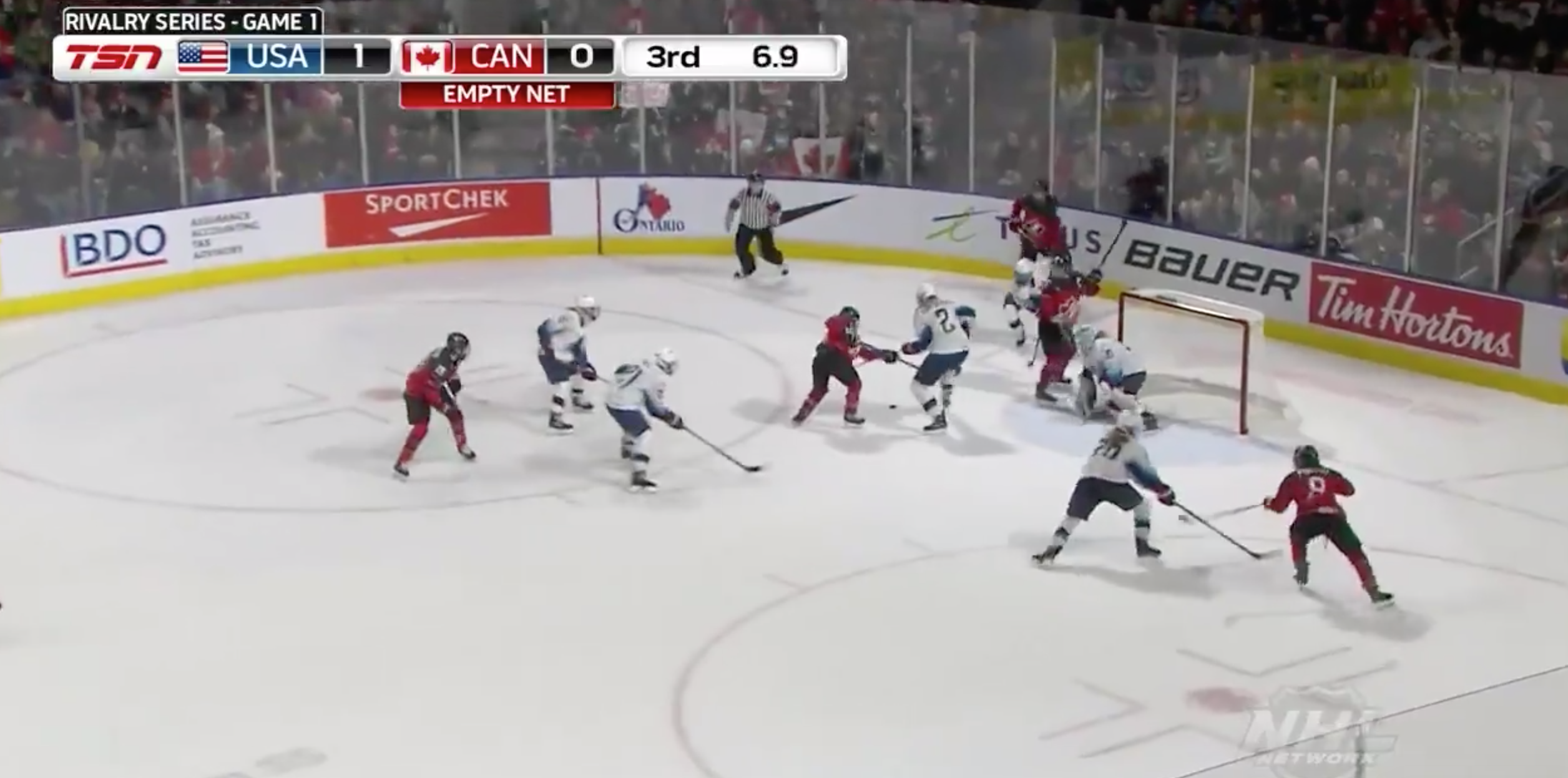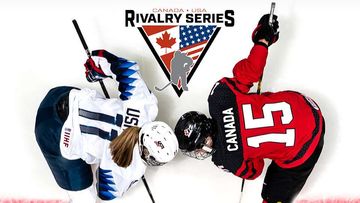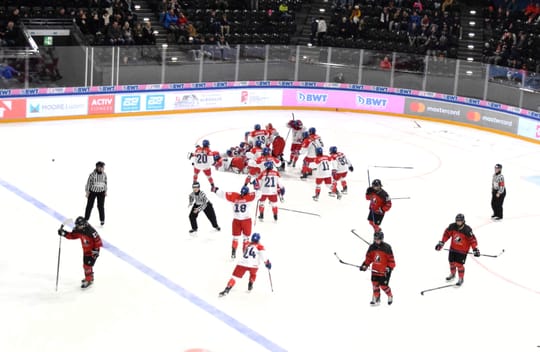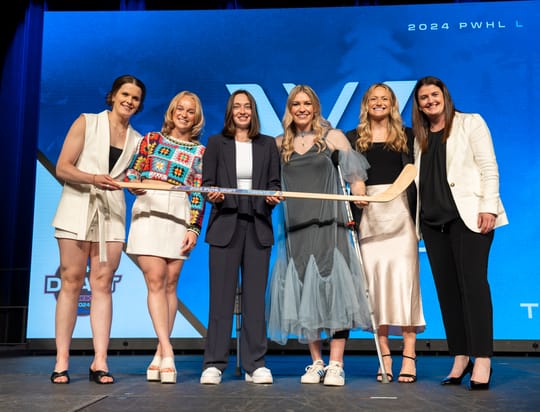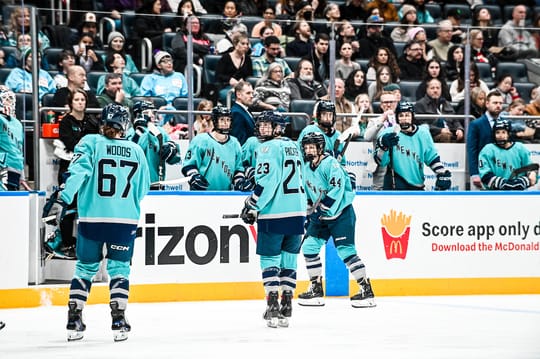After Team USA's thrilling 1-0 win over Team Canada last night in Game 1 of the 2019 Rivalry Series, we asked our resident Canada expert Kirsten Whelan and resident Team USA expert Nicole Haase for five things that each team did right, or wrong, in the initial tilt.
Kirsten on Team Canada
Building on existing chemistry
Many of Canada's lines paired current CWHL teammates, which is practical for a series which such limited preparation time. It's also beneficial in that rookies Ann-Sophie Bettez and Rebecca Leslie were placed alongside Marie-Philip Poulin and Brianne Jenner, respectively, giving them the best chance of integrating comfortably in their senior team debuts. It hasn't always felt like Team Canada has given promising players the best possible chance to succeed, so this was refreshing, and it showed in their play.
The penalty kill wasn't scary
Canada's penalty kill has been reliable for a while, even if it's been mildly terrifying and involved a whole lot of blocked shots. This time, though, the PK not only kept the puck out of the net, but kept the puck out of the Canadian zone for long periods of time, even managing to set up in the American zone at one point. It's been more aggressive without giving up dangerous chances, which is truly the best of both worlds.
Moving the puck, and their feet
It's pretty self-explanatory, but players were mobile and competently beating U.S. forwards in foot races. They outshot their opponents, by a lot. Passing was strong throughout most of the game, and Canada managed to slow down the U.S. in the neutral zone. All of these areas have been the Americans' biggest strengths in recent years, so it's promising that Team Canada was not just successfully defending but actively countering them from the jump.
The power play… happened, allegedly
Did Canada have a power play? If the countdown on the scoreboard wasn't there to remind you that the failure to sustain zone time was happening despite a skater advantage, you might not have known, and you would've felt better for it. The power play often gets left to the wayside when a team has literally one day together to practice – it's the least vulnerable moment to throw your top players out and hope for the best – but this one sure wasn't good. On paper the units are excellent, so maybe with some practice time it'll be fine, but it's worth keeping an eye on.
Keeping calm under pressure
If Canada is known for one thing, it's this, perhaps entirely thanks to the gold-medal game in Sochi. As the clock ran down on Tuesday with the Canadians trailing 1-0, though, the team couldn't connect a pass and complete a clean zone exit or entry to save their lives. Goaltender Emerance Maschmeyer couldn't leave her crease for the extra attacker until the bitter end because the team in front of her couldn't take control of the puck. With so many Canada-USA games coming down to the wire, this lack of poise could prove make-or-break at Worlds.
Nicole on Team USA
Alex Rigsby was stellar in net.
Rigsby was not even invited to pre-Olympic camp in 2014 and it left her feeling like she had something to prove. She made the Olympic team in 2018, but then didn’t even get on the ice during the games. There were plenty of naysayers, but she did quite a bit to help quiet them on Tuesday. There were times she single-handedly kept USA in the game (we'll get to that). It’s clear that playing regularly with the Calgary Inferno has made a big difference for her. Heading into 2017, she was playing occasionally for the not-yet-full-time Minnesota Whitecaps and it seems like she is thriving with the regular time on ice against quality competition.
There’s room to grow.
The Americans walked away with a hard-fought 1-0 win despite not having their best showing. USA is going with some different players on this roster without the NCAA players available and that means some brand new faces. Savannah Harmon was far out-matched by Rebecca Johnson for example, especially early on, and the new lines definitely didn't have the flow and chemistry we're used to seeing as passes consistently didn't find their mark.
There was limited puck-possession.
We're used to some seamless, free-flowing puck movement from this team, with dynamic breakouts and fast-paced zone entry. Tuesday, they really never held on to the puck long enough to ever get that going. Some of it can be attributed to the new lines and the fact that they've had limited time together as a team, but I'll still be looking for some improvement on this for the next two games.
That power play was atrocious.
If there's one place there should be puck-possession and crisp passing, it's with an extra attacker and that just wasn't there for Team USA. Canada had more legitimate opportunities to score short-handed than the Americans did on the power play. We can give the benefit of small sample size, but there's pretty much nowhere to go but up after Tuesday.
Spectacular final minutes.
The final five minutes were Team USA's best as Canada tried to force overtime. The forecheck was impressive and the Americans gave no quarter in the neutral zone. Canada really couldn't get set up at all and Team USA consistently disrupted their attempts at a breakout, so much so that the Canadians struggled to pull Emerance Maschmeyer for an extra attacker until there were just seconds left on the clock.
